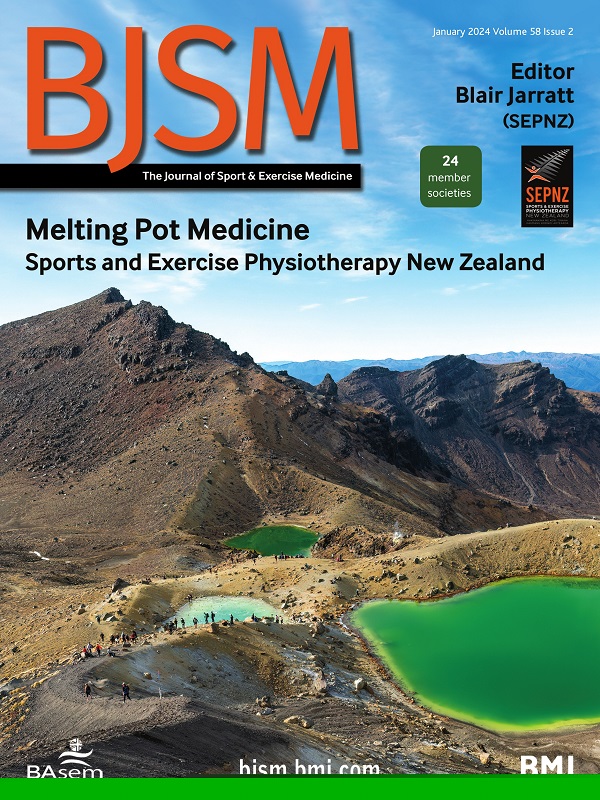Safe sport and health promotion: elite youth athletes' perspectives at the Winter Youth Olympic Games.
IF 16.2
1区 医学
Q1 SPORT SCIENCES
引用次数: 0
Abstract
OBJECTIVE The Youth Olympic Games (YOG) combines competition with educational initiatives for elite youth athletes. Despite the benefits of sport participation, young athletes face risks related to health and interpersonal violence (IV). The 'Mind, Body & Me' initiative at the 2024 Gangwon YOG was designed to promote holistic athlete health and safe sport. This study assessed youth athletes' understanding of health-related rights, perceptions of safe sport and awareness of safeguarding services. METHODS A cross-sectional survey was conducted among 1211 YOG athletes. Data were analysed using descriptive statistics and χ2 tests to identify differences based on sex, continent, sport and language. Content analysis was performed for qualitative responses. RESULTS Most athletes felt that their health-related rights were respected; however, they reported discomfort seeking mental health support. Athletes described healthy sport as 'fun,' 'safe' and 'good,' while unhealthy sport was linked to 'bad,' 'bullying' and 'negative,' with regional variations. Bullying was the most widely recognised form of IV, particularly in female athletes, who were more aware of IV than males. Male athletes and those from Europe and Oceania expressed greater discomfort with reporting IV. While 74% were aware of the International Olympic Committee's safeguarding services, knowledge gaps existed among female athletes and non-English speakers. Athletes asked for more interactive tools, mental health programmes and improved accessibility to resources. CONCLUSION Our findings highlight the importance of a holistic, athlete-centred approach, the need to improve access to health support services, the value of culturally tailored safeguarding strategies and the imperative of integrating safeguarding into broader health policies in youth sport.安全运动与健康促进:冬季青奥会优秀青年运动员的视角。
目的青年奥林匹克运动会(YOG)将竞技与培养优秀青年运动员的教育活动相结合。尽管参加体育运动有好处,但年轻运动员面临与健康和人际暴力有关的风险(四)。2024江原青奥会的“心灵、身体和我”计划旨在促进运动员的整体健康和安全运动。本研究评估了青年运动员对健康相关权利的理解、对安全运动的认识以及对保障服务的认识。方法对1211名青奥会运动员进行横断面调查。采用描述性统计和χ2检验对数据进行分析,以确定基于性别、大洲、运动和语言的差异。对定性反应进行内容分析。结果大多数运动员认为他们的健康权利得到了尊重;然而,他们表示在寻求心理健康支持时感到不适。运动员将健康的运动描述为“有趣”、“安全”和“有益”,而不健康的运动则与“有害”、“欺凌”和“消极”联系在一起,并存在地区差异。欺凌是最广泛认可的静脉注射形式,特别是在女运动员中,她们比男性更了解静脉注射。男性运动员以及来自欧洲和大洋洲的运动员对报告IV表示更大的不适。虽然74%的人知道国际奥委会的保障服务,但女性运动员和非英语人士之间存在知识差距。运动员要求更多的互动工具、心理健康规划和更好地获得资源。结论:我们的研究结果强调了全面的、以运动员为中心的方法的重要性,改善获得卫生支持服务的必要性,有文化针对性的保障战略的价值,以及将保障纳入更广泛的青少年体育卫生政策的必要性。
本文章由计算机程序翻译,如有差异,请以英文原文为准。
求助全文
约1分钟内获得全文
求助全文
来源期刊
CiteScore
27.10
自引率
4.90%
发文量
217
审稿时长
3-8 weeks
期刊介绍:
The British Journal of Sports Medicine (BJSM) is a dynamic platform that presents groundbreaking research, thought-provoking reviews, and meaningful discussions on sport and exercise medicine. Our focus encompasses various clinically-relevant aspects such as physiotherapy, physical therapy, and rehabilitation. With an aim to foster innovation, education, and knowledge translation, we strive to bridge the gap between research and practical implementation in the field. Our multi-media approach, including web, print, video, and audio resources, along with our active presence on social media, connects a global community of healthcare professionals dedicated to treating active individuals.

 求助内容:
求助内容: 应助结果提醒方式:
应助结果提醒方式:


